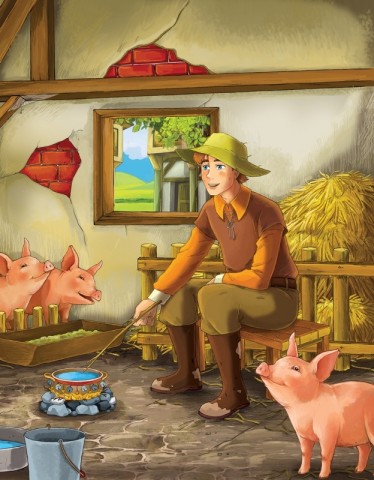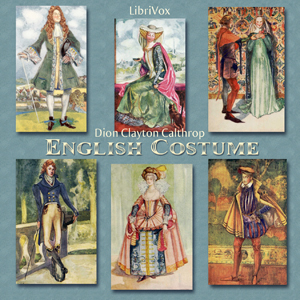The Emperor’s New Clothes - Hans Christian Andersen

Download the audio of the Emperor's New Clothes (right click, save as)
 The Emperor is enormously vain and likes nothing better than to show off his clothes. Two weavers comes to his court saying that they makes clothes that are like no others - anyone who is simple in the head, or unfit for his job, will not be able to see them.
The Emperor is enormously vain and likes nothing better than to show off his clothes. Two weavers comes to his court saying that they makes clothes that are like no others - anyone who is simple in the head, or unfit for his job, will not be able to see them.
All the courtiers say that the clothes are quite magnificent, and the Emperor plans to wear his new suit for the procession through the centre of the city.
The moral of this story rings so very true! What we are doing is totally absurd, but we can't stop because everybody else seems to believe that it's the right thing to do. Yet they can probably see it's just as ridiculous as we can.
The little boy who literally sees through the Emperor's New Clothes only appears for a moment, and yet he is one of the greatest heroes of all fairy tales - for he speaks the truth that nobody else dares to speak.
Proofread by Claire Deakin.
Read by Natasha. Duration 18 min.
Many years ago, there was an emperor, who was so excessively fond of new clothes, that he spent all his money on the finest suits.
He did not trouble himself in the least about his soldiers; nor did he care to go to the theatre or out hunting, except when there was a chance to show off his new clothes.
He had a different suit for each hour of the day. Just as you might say of any other king or emperor, “He is sitting in his council,” people used to say of him, “He is sitting in his wardrobe.”
Time passed merrily in the large town which was his capital; strangers arrived every day at the court. One day, two rogues, calling themselves weavers, came to the court. They said that they knew how to weave clothes of the most beautiful colours and elaborate patterns. The clothes made from their cloths were like no others, for they were invisible to everyone who was either unfit for their job, or extremely simple in the head.
“These must, indeed, be splendid clothes!” Thought the emperor. “Had I such a suit, I might at once find out what men in my empire are unfit for their jobs, and also be able to tell the wise from the foolish! This stuff must be woven for me immediately.”
He ordered large sums of money to be given to both the weavers so that they might begin their work. So the two false weavers set up two looms, and pretended to work very busily, though in reality they did nothing at all. They asked for the most delicate silk and the purest gold thread; put both into their own knapsacks, and then continued their pretend work at the empty looms until late at night.
“I should like to know how the weavers are getting on with my cloth,” said the emperor to himself, after some little time had gone by. He was, however, rather embarrassed, when he remembered that a simpleton, or someone unfit for his office, would be unable to see the results of their work. To be sure, he himself would not have any trouble seeing the clothes, but yet, thought it would be better to send somebody else to report on the weavers and their work.
All the people throughout the city had heard of the wonderful cloth; and all were anxious to earn how wise, or how ignorant, their neighbours might prove to be.
“I will send my faithful old minister to the weavers,” said the emperor at last, after some thought “he will be best able to see how the cloth looks; for he is a man of sense, and no one can be more suitable for his office than he is.”
So the faithful old minister went into the hall, where the knaves were working with all their might, at their empty looms. “What can be the meaning of this?” Thought the old man, opening his eyes very wide. “I cannot see the least bit of thread on the looms.” However, he did not speak his thoughts aloud.
The tricksters asked him very politely to be so good as to come nearer their looms; and then asked him whether the design pleased him, and whether the colours were not very beautiful - at the same time pointing to the empty frames. The poor old minister looked and looked, he could not see anything on the looms, for a very good reason: There was nothing there.
“What!” Thought he again. “Is it possible that I am a simpleton? I have never thought so myself; and no one must know it now if I am so. Can it be, that I am unfit for my office? No, that must not be said either. I will never confess that I could not see the stuff.”
“Well, Sir Minister!” said one of the knaves, still pretending to work. “You do not say whether the stuff pleases you.”
“Oh, it is excellent!” Replied the old minister, looking at the loom through his spectacles. “This pattern, and the colours, yes, I will tell the emperor without delay. How very beautiful I think them.”
“We shall be much obliged to you,” said the impostors, and then they named the different colours and described the pattern of the pretend stuff. The old minister listened attentively to their words, in order that he might repeat them to the emperor; and then the knaves asked for more silk and gold, saying that it was necessary to complete what they had begun. However, they put all that was given them into their knapsacks and continued to work with as much pretend effort as before at their empty looms.
The emperor now sent another officer of his court to see how the men were getting on, and to find out whether the cloth would soon be ready. It was just the same with this gentleman as with the minister; he looked at the looms on all sides, but could see nothing at all but the empty frames.
“Does not the stuff appear as beautiful to you, as it did to my lord the minister?” Asked the impostors of the emperor’s second ambassador; at the same time making the same gestures as before, and talking of the design and colours which were not there.
“I certainly am not stupid!” Thought the messenger. “It must be, that I am not fit for my good, well-paid job! That is very odd; however, no one shall know anything about it.” Therefore he praised the stuff he could not see, and declared that he was delighted with both colours and patterns. “Indeed, please your Imperial Majesty,” said he to the emperor when he returned, “the cloth which the weavers are preparing is extraordinarily magnificent.”
The whole city was talking of the splendid cloth which the emperor had ordered to be woven at his own expense.
Now the emperor for himself wished to see the costly manufacture, while it was still in the loom. Accompanied by a select number of officers of the court, among whom were the two honest men who had already admired the cloth, he went to the crafty impostors, who, as soon as they knew the emperor was on his way, went on working more hard than ever; although they still did not pass a single thread through the looms.
“Is not the work absolutely magnificent?” Said the two officers of the crown, who already who had been before. “If Your Majesty will only be pleased to look at it! What a splendid design! What glorious colours!” At the same time they pointed to the empty frames; for they imagined that everyone else could see this exquisite piece of workmanship.
“How is this?” Said the emperor to himself. “I can see nothing! This is indeed a terrible affair! Am I a simpleton, or am I unfit to be an emperor? That would be the worst thing that could happen” - ”Oh! The cloth is charming,” said he, aloud. “It has my complete approval.” He smiled most graciously, and looked closely at the empty looms; for on no account would he say that he could not see what two of the officers of his court had praised so much.
All his retinue now strained their eyes, hoping to discover something on the looms, but they could see no more than the others; nevertheless, they all exclaimed, “Oh, how beautiful!” And advised his majesty to have some new clothes made from this splendid material, for the public procession which was due to take place soon.
“Magnificent! Charming! Excellent!” Everyone said on all sides; and everyone was uncommonly cheerful. The emperor shared in the general satisfaction; and presented the impostors with the riband of an order of knighthood, to be worn in their buttonholes, and the title of “Gentlemen Weavers.”
The rogues sat up the whole of the night before the day on which the procession was to take place, and had sixteen lights burning so that everyone might see how anxious they were to finish the emperor’s new suit. They pretended to roll the cloth off the looms; cut the air with their scissors, and sewed with needles without any thread in them. “See!” Cried they, at last. “The emperor’s new clothes are ready!”
Now the emperor, with all the grandees of his court, came to the weavers; and the rogues raised their arms, as if holding something up, saying, “Here are Your Majesty’s trousers! Here is the scarf! Here is the cloak! The whole suit is as light as a cobweb; one might fancy one has nothing at all on, when one is dressed in it. That, however, is the great virtue of this delicate cloth.”
“Yes indeed!” Said all the courtiers, although not one of them could see anything of this exquisite manufacture.
“If Your Imperial Majesty will be graciously pleased to take off your clothes, we will fit on the new suit, in front of the looking glass.”
The emperor was accordingly undressed, and the rogues pretended to array him in his new suit; the emperor turning round, from side to side, looking in the glass.
“How splendid His Majesty looks in his new clothes, and how well they fit!” Everyone cried out. “What a design! What colours! These are indeed royal robes!”
“The canopy which is to be carried over Your Majesty, in the procession, is waiting,” announced the chief master of the ceremonies.
“I am quite ready,” answered the emperor. “Do my new clothes fit well?” Asked he, turning himself round again before the looking glass, in order that he might appear to be examining his handsome suit.
The lords of the bedchamber, who were to carry His Majesty’s train felt about on the ground, as if they were lifting up the ends of the robes, and pretended to be carrying something; for they would by no means let anyone see that they were simple or unfit for their jobs.
So now the emperor walked under his high canopy in the midst of the procession, through the streets of his capital. All the people standing by, and those at the windows, cried out, “Oh! How beautiful are our emperor’s clothes! What a magnificent train there is to the robes and how gracefully the scarf hangs!” In short, no one would allow that he could not see these much admired clothes - because, in doing so, he would have declared himself either a simpleton or unfit for his job. Certainly, none of the emperor’s various suits had ever made so great an impression as these invisible ones.
“But the emperor has nothing at all on!” Said a little child.
“Listen to the voice of innocence!” Exclaimed his father; and what the child had said was whispered from one to another.
“But he has nothing at all on!” At last cried out all the people. The emperor was suddenly embarrassed, for he knew that the people were right; but he thought the procession must go on now! And the lords of the bedchamber took greater pains than ever, to appear holding up the robes although, in reality, there were no robes at all.
And that’s the story of the Emperor’s New Clothes by Hans Christian Andersen.
Bertie says that in real life, people are often more silly in a crowd than they are on their own. If you think that everybody else believes something, then it must be true – and you have to be very brave to be like the little boy in the story and stand up and say what can see with your own eyes.





